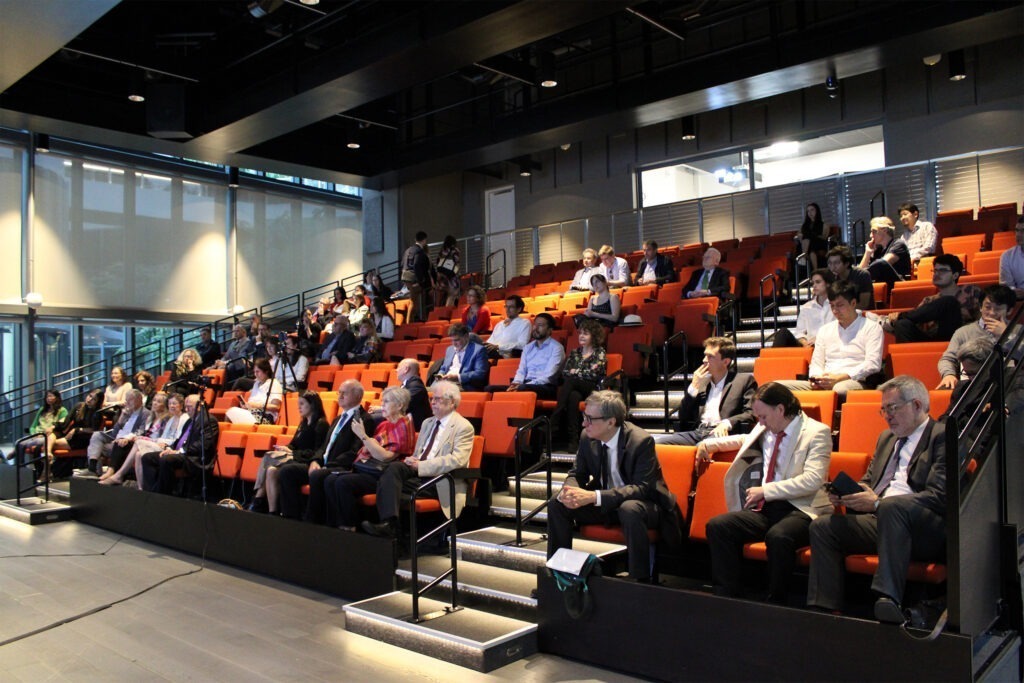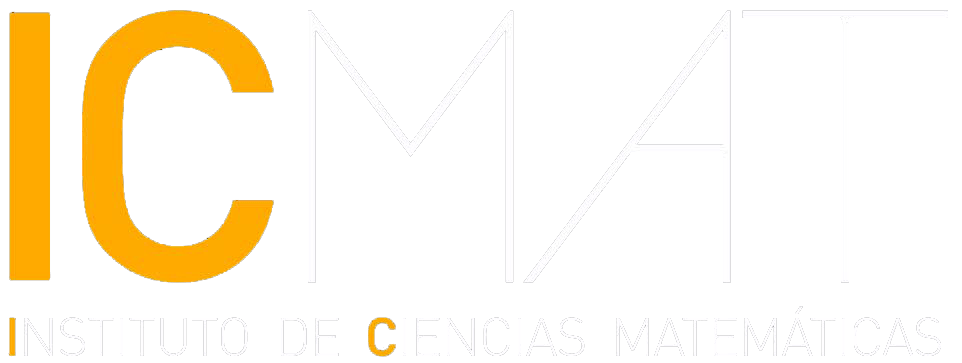
Asistentes a la entrega de los premios latinoamericanos de matemáticas. Imagen: Start Communications
Laura M. Iraola (ICMAT) and Leonardo Zacarin (Start Communications)
The Institute of the Mathematical Sciences of the Americas (IMSA) was established in 2019 with the intention of “fostering dialogue between Latin America, the United States, and the world, with special attention to the Hispanic community.” It is in Miami (USA), where the Institute is located, that in recent years, all efforts have been concentrated to make the excellent mathematical research carried out in countries in these areas a global reference.
In their day-to-day lives, scientists from Latin America must face a series of barriers, which prevent them from advancing at the desired pace. They encounter linguistic, gender, cultural, and, above all, economic challenges. “In Mexico, we have run out of funding for science. For a year and a half now, if I want to go to a conference, I have to pay for it myself, and if I want to have a visitor, I have to invite him or her to my house,” says José Seade, president of the Mexican Academy of Sciences and researcher and professor at the National Autonomous University of Mexico (UNAM). “I believe that institutions like CONACYT, in Mexico, CONICET, in Argentina, CONICYT, in Chile, or Colciencias, in Colombia, created to support the development of science, should be more stable and, overall, independent, not affected by changes in government,” points out Alberto Verjovsky, professor and researcher at UNAM.
Establishing collaboration networks and exchanging knowledge is one of the pillars that sustain and drive mathematical research forward, for which it is necessary to undertake stays in other institutions, attend conferences, or visit collaborators. “The money we receive often only covers the plane ticket; the peso, compared to other currencies, has very little value,” says Raquel Perales, researcher at the Center for Research in Mathematics (CIMAT) in Mexico.
Despite the fact that all these daily challenges still exist, Latin American mathematics is making its way and enjoys a better position than in previous years. “It is true that there is a clear improvement; for example, now it is not necessary to study abroad, but we are still far from where we could be. Conditions make excellent Mexican and Latin American scientists still stay in other countries,” says Seade. “In general, I believe that everything is going for the better, and institutions like IMSA play a very important role because they serve as a stimulus and help to provide an overview of the different countries,” adds Verjovsky. In addition, there are role models to look up to among them. “Brazil has a very strong scientific policy for the development of mathematics,” says Ludmil Katzarkov, director of IMSA. “What most countries in Latin America need is a similar policy, and the interaction provided by activities like those of IMSA can help them achieve it,” he adds.
First steps
Perales, Verjovsky, and Seade have been three of the award-winning researchers in the first edition of the Latin American Mathematics Research Prizes. The former has received the Young Mathematician IMSA Prize along with Miguel Walsh from the University of Buenos Aires (Argentina). Verjovsky has been recognized with the Established Mathematician IMSA Prize. Meanwhile, Seade has received the Latin American Mathematical Leadership IMSA Prize.
Granted by IMSA, these awards aim to become a symbol of prestige within the mathematical community. “With these awards, we not only seek to celebrate the outstanding contributions to mathematics by Latin American researchers, who often work in adverse conditions and with limited resources, but also aim to inspire future generations,” says the organisation.
In addition, three IMSA fellowships have been awarded: Márcia Cristina Anderson Braz Federson from the Institute of Mathematical and Computational Sciences of the University of São Paulo (Brazil); Carolina Benedetti from the Universidad de los Andes, Bogotá (Colombia); and Daniel Barrera Salazar from the University of Santiago de Chile. Apart from these awards, Jeffrey Ben Fuqua, an essential part in the foundation of IMSA, has also been granted the recognition as IMSA Honorary Ambassador, and the IMSA Service Award has been given to Guillermo Prado, dean of the University of Miami.
The awards ceremony took place on January 24 within the framework of the first Mathematical Waves Miami, a meeting for researchers in mathematics from different countries in Latin America. From January 21 to 25, a series of conferences were held at the University of Miami with the aim of promoting excellence in the field of mathematics and establishing a platform that facilitates dialogue and scientific cooperation among mathematicians, with special attention to the integration of the Hispanic community in the global mathematical discourse.
“This conference has been a space to give Latin American researchers the due respect, recognizing their work, and encouraging them to go further, as well as to stimulate and foster the development of mathematics and science in these countries,” expresses Katzarkov. “They are people educated in the best schools in the world, so the potential is enormous,” he highlights.
Members of the Mathematical Societies Collaborative Group (MSCG) of IMSA and the presidents of the mathematical societies of Brazil and Ecuador approved the week of activities. “This event is extremely important for the mathematical community in the Americas, especially in Latin America and the Caribbean Region. The quality of the presentations and the exchange of knowledge promoted here enrich our mathematical community and bring exceptional contributions. We look forward to the next days of learning and collaboration,” praised the Brazilian Jaqueline Mesquita. “These events can change, to some extent, the public perception of mathematics, showing that it is an exciting, relevant field with a high degree of creativity and even an artistic dimension,” added Diego Recalde, from the Ecuadorian Society of Mathematics.
Institute of the Mathematical Sciences of the Americas (IMSA)
The Institute of the Mathematical Sciences of the Americas (IMSA) was born in 2019 with the aim of contributing to the advancement and communication of fundamental knowledge in mathematical sciences. Its mission is to foster dialogue between Latin America, the United States, and the world, with special attention to the Hispanic community.
The Institute is financially supported by the Simons Foundation and the University of Miami. Additionally, IMSA collaborates with other institutions from different parts of the world, through the IMSAC consortium. This consortium is formed, along with IMSA, by the Institute of Mathematics, Polish Academy of Sciences; International Centre for Mathematical Sciences, Bulgarian Academy of Sciences; Instituto de Ciencias Matemáticas (ICMAT) (Madrid, Spain); Universidad de la Frontera (Chile); Universidad del Norte (Colombia); Universidad Nacional Autónoma de México and Universidade Estadual de Campinas (Brazil).
